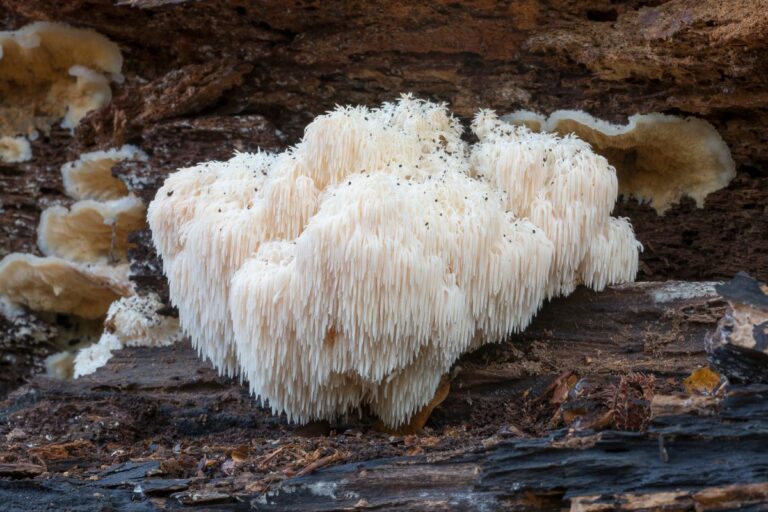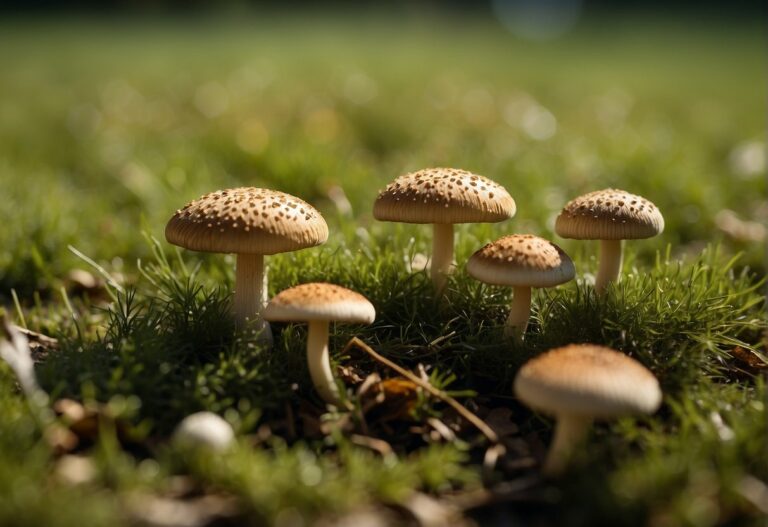As an enthusiast exploring the dynamic realm of nutrition for sports performance, I’ve noticed a growing trend among athletes who are harnessing the benefits of mushrooms to enhance their training and recovery. Recognizing the potential of mushrooms for athletic performance, my curiosity spurred me to delve deeper into how these natural wonders can support rigorous physical demands. Mushrooms aren’t just a topping on your favorite pizza; they’re emerging as nutrition powerhouses that could be integral to an athlete’s dietary regimen.
The benefits of mushrooms for athletes extend far beyond their taste. These fungi are brimming with essential nutrients that support energy, endurance, and recovery. It’s fascinating to uncover that mushroom nutrition for sports performance includes the presence of beta-glucans, antioxidants, and B-vitamins – components that can contribute significantly to an athlete’s stamina and recuperation process. Moreover, mushrooms contain natural compounds that may help boost immunity, which is crucial for those engaging in intense training schedules.
My journey into the world of mushrooms has led me to ponder their potential in supplement form and as a strategic addition to whole-food diets tailored for athletes. It’s imperative to consider current research, factual data, and personal anecdotes to understand the full scope of how these earthy edibles can contribute to optimal athletic performance.
The Intersection of Mycology and Athletics
Table of Contents
As someone deeply embedded in the exploration of optimal health and performance, it’s been impossible for me not to notice the intriguing intersection between mycology and athletics. This junction represents a fusion of ancient natural wisdom and cutting-edge sports science. Mushroom supplements for athletes, leveraging the mushroom performance-enhancing properties, are pioneering a new pathway for athletic optimization.
The term mycology, the study of fungi, may sound distant to the realm of athletics at first glance. Yet, recent scientific explorations have shed light on the profound impact of mushrooms on athletic performance. It’s exhilarating for me to uncover and share how mushrooms can bolster an athlete’s training regimen, and here’s how:
- Fungi produce a slew of bioactive compounds which foster enhanced endurance and vitality, essential for athletes pushing their limits.
- The discovery of adaptogenic properties in certain mushrooms, like cordyceps and lions mane, guide the body towards homeostasis—an aspect paramount for peak performance.
- MushROOM-like a natural laboratory, have engineered compounds that may augment oxygen uptake and utilization—a coveted trait for endurance athletes.
Given their natural origins, it’s reassuring to advocate for these supplements, knowing they’re generally considered safe and clean for sportspersons’ consumption, especially within competitive circles where doping is a critical concern.
“Harnessing the science of mycology, athletes can tap into a natural source of performance enhancement, addressing not only physical but also cognitive edges on the track, field, or court.”
It’s imperative to bridge the gap between mycological research and its practical application in sports. It brings me great satisfaction to inform fitness enthusiasts and elite athletes alike about the following mushroom species known for their ergogenic effects:
| Mushroom Type | Main Compounds | Reported Benefits |
|---|---|---|
| Cordyceps | Beta-glucans, cordycepin | Increased ATP production, improved oxygen utilization |
| Reishi | Polysaccharides, triterpenes | Immune system modulation, stress resistance |
| Lion’s Mane | Erinacines, hericenones | Cognitive enhancement, nerve growth factor stimulation |
| Chaga | Beta-glucans, antioxidants | Reduced inflammation, boosted endurance |
My exploration into the realm of mushroom supplements for athletes leads me to a confident assertion that mycology plays a significant role in the future of sports nutrition and athletic performance optimization. The potential for mushrooms to serve as natural, holistic performance enhancers elevates the field of athletics to exciting new heights.
Mushrooms for Athletic Performance: Unveiling the Secrets
My fascination with the burgeoning world of functional mushrooms and their application in sports has unearthed a trove of insights. These natural allies offer more than just flavor; they boast a nutrient-rich profile ideal for athletes. But what exactly makes these fungal friends so beneficial for those striving for peak physical performance?

Nutrient-Rich Profiles of Functional Mushrooms
When it comes to mushroom nutrition for sports performance, these earthy organisms are powerhouse providers of valuable vitamins and minerals. My foray into their world revealed that mushrooms like shiitake, maitake, and cordyceps are loaded with protein, fiber, B-vitamins, antioxidants, and essential minerals such as selenium, potassium, and copper. These components are critically important for muscle strength, energy metabolism, and a healthy immune system, which serves as the foundation for any successful athletic endeavor.
Mushroom Performance-Enhancing Properties
Delving deeper into the benefits of mushrooms for athletes, I’ve unearthed remarkable findings on their performance-enhancing properties. Notably, mushroom adaptogens, like the cordyceps, have been shown to improve endurance and stamina. These are not just folkloric claims; studies suggest that the adaptogenic nature of these mushrooms contributes to improved stress response, potentially leading to enhanced physical performance and endurance.
The power of these fungi doesn’t just lie in traditional benefits; they’re also believed to enhance oxygen utilization, an essential factor for endurance athletes. The evidence pointing towards the presence of compounds in cordyceps, specifically, that may increase ATP production, helps athletes maintain energy during prolonged periods of physical exertion.
As I weave through the compelling narrative of mushrooms in sports nutrition, it’s evident that their potential extends from the forest floor to the finish line, carving a niche for themselves as indispensable allies in an athlete’s dietary arsenal.
Mushrooms and Inflammation: The Recovery Connection
It’s not all about the energy boost. Inflammation is a natural part of the recovery process in training, and managing it effectively is crucial for athletes. That’s where the role of mushrooms and inflammation interconnect. Compounds in mushrooms, such as beta-glucans found in chaga and reishi, have been acknowledged for their anti-inflammatory properties, which can be instrumental in post-workout recovery.
Moreover, embracing the concept of medicinal mushrooms for athletic recovery adds another layer to the recovery process. It’s not uncommon to hear of athletes turning to mushroom-derived supplements to support muscle repair and systemic recovery, contributing to a quicker and more efficient return to peak performance after strenuous activity.
In summary, athletes’ continuously evolving quest for natural performance aids has led them down the fungi path—a path rich with potential, backed by both age-old wisdom and pioneering research.
Medicinal Mushrooms for Athletic Recovery
In my quest to explore the connections between natural supplements and athletic performance, I’ve been particularly intrigued by the potential of medicinal mushrooms for athletic recovery. These natural allies are not just another health fad; they are deeply rooted in traditional medicine and are now being embraced by the athletic community for their recovery-enhancing properties.
The use of mushroom supplements for muscle recovery is gaining traction as athletes and fitness enthusiasts look for natural ways to improve post-exercise recovery. These supplements are touted for their ability to support the body’s natural healing processes, reduce inflammation, and help repair muscle tissue after intensive workouts.
Balancing training with adequate recovery is essential for any athlete. We know the muscle soreness and fatigue that can follow a strenuous session is more than discomfort; it’s a part of the adaptation process that leads to improved performance. This is where incorporating mushroom supplements into a recovery plan comes in.
From the antioxidant-rich chaga to the adaptogenic power of cordyceps, not all mushrooms serve the same purpose. Here’s a closer look at the specific attributes of certain mushrooms which make them stand out in the realm of muscle recovery:
| Mushroom Type | Key Compounds | Recovery Benefits |
|---|---|---|
| Cordyceps | Adenosine, Cordycepin | Boosts energy production, supports oxygen utilization |
| Reishi | Polysaccharides, Triterpenes | Enhances immune function, reduces post-exercise inflammation |
| Lion’s Mane | Erinacines, Hericenones | Stimulates nerve growth, aids cognitive recovery |
| Chaga | Beta-D-Glucans, Betulinic Acid | Antioxidant properties reduce oxidative stress |
The prevailing thought in the fitness world is that natural remedies, such as medicinal mushrooms, can be just as potent—if properly utilized—as any other recovery method. Imagine taking a calf-wrapping session, an ice bath, or a protein shake, and combining those recovery strategies with the power of fungi. The potential for accelerated recovery is immense, as these mushrooms contain essential bioactive compounds that can complement the traditional recovery modalities with which most athletes are already familiar.
As I continue to delve into the realm of recovery practices for athletes, I am ever more convinced of the synergy between rigorous training and the healing power of medicinal mushrooms. Their natural compounds support my body’s recovery process, potentially allowing me to bounce back faster and stronger.
Finally, while the path to optimum recovery is multifaceted, including various modalities like rest, nutrition, and active recovery, the addition of mushroom supplements could very well be a game changer for athletes looking to stay on top of their recovery game. The forest, it seems, holds more than beauty—it holds a key to better recovery and, by extension, enhanced athletic performance.
The Science Behind Mushroom Supplements for Athletes
My exploration into the potent world of mushrooms has led me to uncover the science behind why athletes across the globe are turning to mushroom supplements. The interplay between the natural compounds in mushrooms and the rigorous demands of athletic performance is a fascinating subject worthy of exploration. Indeed, the metamorphosis of simple spores into mushroom adaptogens for endurance athletes tells a story of natural synergy and scientific curiosity.
Modern research is only beginning to scratch the surface of what our ancestors seem to have known instinctively—mushroom compounds can be powerful allies for endurance and vitality.

But, of course, hearing about these improvements is one thing; seeing the evidence is another. Below is a snapshot encapsulating the transformative effects that athletes have experienced after incorporating mushroom nutrition into their lifestyles:
| Athlete Profile | Discipline | Mushroom Nutrition | Notable Improvements |
|---|---|---|---|
| Elite Marathoner | Long-Distance Running | Cordyceps Extract | Improved oxygen utilization, extended endurance |
| Professional Cyclist | Cycling | Reishi and Lion’s Mane | Enhanced focus, reduced stress, better sleep quality |
| Ironman Triathlete | Triathlon | Chaga and Cordyceps Blend | Increased energy levels, faster recovery post-race |
Moreover, it’s not just individual athletes who are reporting positive outcomes. Teams across various sports disciplines have noticed a discernible improvement in overall team performance during their most demanding periods of competition.
- Swim Team: Increased resistance to common colds and flu during peak training seasons.
- Soccer Squad: Noted an uptick in player recovery rates following intense matches after introducing mushroom supplements.
- Basketball Team: Improved focus and concentration during high-stress playoff games.
These real-life accounts serve as powerful testaments to the potential of mushroom nutrition in the athletic world. They’re fuelling a fascination within me and many others to investigate further into how mushrooms can sustainably support athletic achievement. It’s compelling to see how ancient remedies are finding their place in modern sports nutrition, one success story at a time.
Mushroom Supplements for Muscle Recovery: How They Work
My fascination with natural remedies for athletic performance has led me to the doorstep of medicinal mushrooms, particularly their use in mushroom supplements for muscle recovery. Time and again, I’ve seen these supplements rise in popularity among athletes for their perceived benefits in supporting the body’s recuperation process after intense physical activity. It’s the intricate blend of proteins and amino acids within these fungi that seems to offer a unique pathway to recovery that’s grounded in nature.

Proteins and Amino Acids in Recovery
It’s well-known that proteins and amino acids are the building blocks of muscle repair. After strenuous exercise or training, muscles undergo a recovery process where damaged fibers are rebuilt, often coming back stronger. The role of amino acids in this process is to act as the essential components that muscles use to heal and grow.
So, where do mushroom supplements for muscle recovery come in? Many of these supplements contain varieties of mushrooms that are rich in essential amino acids. Mushrooms like Reishi and Cordyceps are notable for their content of these crucial nutrients, offering a spectrum of amino acids that align closely with the human body’s requirements.
“Mushroom supplements may provide a spectrum of amino acids necessary for effective muscle recovery, aligning closely with the human body’s needs.”
While research continues to shed more light on how exactly these mushrooms facilitate muscle repair, existing studies suggest a potential benefit thanks to the natural bioactive compounds found in these fungi. What’s assured is that when we talk about mushroom supplements for muscle recovery, we’re discussing a multifaceted approach to post-workout rejuvenation. Here’s a closer look at some of the compounds that offer these benefits:
| Mushroom Type | Compounds | Recovery Benefits |
|---|---|---|
| Reishi | Polysaccharides, Ganoderic acids | Immunomodulatory, anti-inflammatory properties |
| Cordyceps | Adenosine, Cordycepin | May enhance ATP production, supporting energy & recovery |
| Lion’s Mane | Hericenones, Erinacines | Neurotrophic factors promoting cognitive health & focus |
The conversation about recovery supplements can’t be complete without examining the synergy between proteins, amino acids, and the various other bioactive compounds present in these mushrooms. Together, they create a powerful natural aid that supports the body’s innate healing processes.
Certainly, my exploration of mushroom supplements for muscle recovery leads me to believe in their promising role as adjuncts to a well-rounded diet for athletes. The key is to remember that recovery is a multi-pronged process, and supplements are just one piece of the puzzle that includes diet, hydration, rest, and proper training techniques.
- Identify personal wellness goals and recovery needs.
- Incorporate mushroom supplements as part of a balanced, protein-rich diet.
- Monitor the body’s response and adjust routines as necessary for optimal recovery.
As I meld scientific inquiry with holistic health practices, the potential of mushrooms to assist in muscle recovery emerges more clearly. Their earth-grown properties seem to hold a natural key to supporting our bodies’ recovery, and with more research, we could uncover the full depth of this connection.
Integrating Mushroom Superfoods into an Athlete’s Diet
As I’ve immersed myself in the study of sports nutrition, the concept of integrating mushroom superfoods into an athlete’s diet has captivated my attention. The rise in popularity of mushroom supplements for athletes points to a paradigm shift in how we view these earth-grown nutrients not only as food but also as an integral part of athletic performance support.
The key to successfully incorporating mushroom superfoods lies in understanding their nutritional profile and then identifying the ideal timing and methods of consumption that align with an athlete’s metabolic demands. This careful integration aims to provide both immediate and long-term benefits, from energy boosts during training to enhanced recovery post-exertion.
Strategies for Incorporating Mushroom Superfoods
- Determine the specific athletic needs based on training intensity and goals.
- Select appropriate mushroom species that align with these nutritional requirements.
- Consider the format of the mushroom—whole, powdered, or encapsulated.
- Integrate mushrooms into pre- and post-workout meals for maximum effect.
- Track and adjust based on individual response and progress.
By implementing these strategies in a targeted manner, athletes can harness the potential power of mushrooms. Knowing when to consume these superfoods is as crucial as understanding their benefits. Therefore, schedule mushroom intake around workout regimes, when the body is most receptive to nutrient absorption and muscle repair.
“Adding mushroom superfoods to my diet not only aligned well with my training load but also supported my body’s adaptation and recovery in unimaginable ways.” – Prominent Track Athlete
A talented track athlete I spoke with credits the inclusion of mushroom superfoods for the notable enhancement in his endurance and focus—key factors in his competitive performance. This anecdote is a bright example of how strategic dietary choices can provide competitive advantages in sporting arenas.
Sample Meal Integration Table for Athletes
| Time of Day | Mushroom Type | Form of Mushroom | Meal Integration |
|---|---|---|---|
| Morning / Pre-Workout | Cordyceps | Powdered | Smoothie with fruits, greens, and protein powder |
| Lunch / Post-Workout | Lion’s Mane | Capsule | Salad topped with grilled chicken and avocado |
| Evening / Dinner | Reishi | Dried | Stir-fried vegetables and tofu with reishi mushrooms |
| Night / Pre-Sleep | Chaga | Extract | Warm beverage with almond milk and honey |
The table above offers a glimpse into how integrating mushroom superfoods can be seamlessly done throughout the day for an athlete’s diet. Mushroom supplements for athletes need not be complex; rather, they should complement and enhance the existing nutrition regimen.
In conclusion, introducing mushroom superfoods into an athlete’s diet requires a strategic approach focused on timing, form, and type of mushroom. Such consideration in integration can lead to substantial benefits in performance and recovery. As I incorporate these fungal jewels into my own diet, the transformative effects on my training continue to impress and inspire further exploration into the world of mycology and athletics.
Conclusion on Mushrooms for Athletic Performance
In the athletic world where peak performance is the gold standard, my exploration into the efficacy of mushrooms has been an eye-opening journey. The integration of mushroom superfoods for athletes has revealed a novel frontier in sports nutrition—one grounded in nature and supported by promising research. The stories of athletic triumph and enhanced recovery attributed to these functional fungi underscore a broader narrative: mushrooms bear a profound potential that is natural, sustainable, and holistic.
Whether you’re a sprinter on the track seeking an extra burst of speed or a weightlifter looking for steady gains, the complex bioactive compounds of mushroom superfoods, such as adaptogens in Cordyceps and anti-inflammatory agents in Chaga, might just be the missing link in your regimen. From what I’ve garnered, mushrooms stand as potent allies in the pursuit of endurance, focus, and recuperation—endless companions for the road to victory.
As my investigation concludes, I am left with a profound sense of respect for these ancient superfoods. My belief is that, as more athletes discover the benefits of mushrooms, these humble yet powerful organisms will secure a definitive place in the pantheon of sports nutrition. What excites me the most is the untapped potential waiting to be explored, for the synergy between mycology and athletic feats promises a landscape where performance is not just enhanced, but transformed.
FAQ
What benefits can mushrooms offer to athletes?
Mushrooms can offer various benefits to athletes, including enhanced energy and stamina, improved immune function, and better stress management. Specific compounds like beta-glucans and adaptogens in mushrooms are known to support overall athletic performance.
How do mushroom supplements enhance athletic performance?
Mushroom supplements can improve athletic performance by providing nutrients that support energy production, recovery, and endurance. They can also have natural adaptogenic properties that help the body manage physical stress during intensive training and competitions.
Can functional mushrooms help with sports performance?
Yes, functional mushrooms like Cordyceps, Reishi, and Lion’s Mane contain compounds that can aid in improving sports performance by increasing oxygen utilization, reducing fatigue, and supporting cognitive functions.
What are the performance-enhancing properties of mushrooms?
The performance-enhancing properties of mushrooms may include boosting ATP production for energy, decreasing lactate levels which can lead to better muscle function, and enhancing mental focus and clarity.
How do mushrooms aid in the recovery process after athletic activities?
Mushrooms can aid in recovery by reducing inflammation and oxidative stress, supporting the immune system, and speeding up muscle repair due to the presence of antioxidants and other bioactive compounds.
What role do medicinal mushrooms play in athletic recovery?
Medicinal mushrooms can assist in athletic recovery by promoting better sleep, reducing muscle damage and inflammation, and providing the body with compounds that support healing and immune function.
How do adaptogens in mushrooms affect endurance athletes?
Adaptogens found in mushrooms can help endurance athletes by helping the body adapt to physical stress, maintaining energy levels, enhancing mental stamina, and improving recovery times between training sessions.
What scientific studies suggest about mushroom supplements for athletes?
While more research is needed, some scientific studies suggest that mushroom supplements may benefit athletes by improving oxygen consumption, increasing energy levels, reducing fatigue, and boosting overall exercise performance.
Are there any real-life success stories of athletes using mushroom nutrition?
Anecdotal evidence and some case studies highlight athletes who’ve experienced improved performance and recovery rates after incorporating mushroom nutrition into their diets, though individual results can vary.
How do mushroom supplements aid in muscle recovery?
Mushroom supplements may aid in muscle recovery by providing anti-inflammatory and antioxidant compounds, helping to reduce muscle damage and alleviate pain post-exercise, allowing athletes to recover more quickly.
What role do proteins and amino acids from mushrooms play in recovery?
Proteins and amino acids from mushrooms could contribute to the synthesis of new muscle proteins, repair of tissue damage, and prevention of muscle breakdown, which are crucial for recovery after intense physical activity.
How can mushroom superfoods be integrated into an athlete’s diet?
Mushroom superfoods can be integrated into an athlete’s diet through supplements, powders that can be added to smoothies or meals, and incorporating whole edible mushrooms into regular dishes to enhance nutritional intake.








